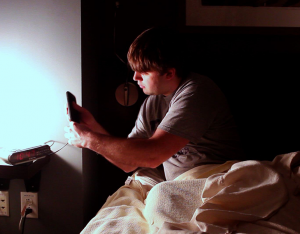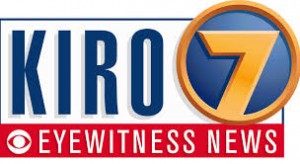 UW CSE professor Shyam Gollakota and PhD student Rajalakshmi Nandakumar have been working with Dr. Nathaniel Watson of the UW Medicine Sleep Center to develop and test a new smartphone app that enables wireless diagnosis of sleep apnea.
UW CSE professor Shyam Gollakota and PhD student Rajalakshmi Nandakumar have been working with Dr. Nathaniel Watson of the UW Medicine Sleep Center to develop and test a new smartphone app that enables wireless diagnosis of sleep apnea.
ApneaApp turns an Android smartphone into an inexpensive and non-invasive diagnostic tool for a potentially life-threatening condition that affects more than 25 million people in the United States alone. The app employs sonar – “similar to the way bats navigate,” lead author Rajalakshmi explains – to track changes in a person’s breathing patterns.
 In a recent clinical study, the researchers demonstrated ApneaApp’s accuracy matches that of a traditional hospital polysomnography test 98 percent of the time. The app can filter out background noise, is capable of distinguishing between the chest movements of two individuals in the same bed, and works with any sleeping position from a distance of up to three feet – all without requiring the patient to be hooked up to special equipment or to spend the night in a sleep center.
In a recent clinical study, the researchers demonstrated ApneaApp’s accuracy matches that of a traditional hospital polysomnography test 98 percent of the time. The app can filter out background noise, is capable of distinguishing between the chest movements of two individuals in the same bed, and works with any sleeping position from a distance of up to three feet – all without requiring the patient to be hooked up to special equipment or to spend the night in a sleep center.
As Shyam notes in UW’s media release announcing the team’s findings, “Right now phones have sensing capabilities that we don’t fully appreciate. If you can recalibrate the sensors that most phones already have, you can use them to achieve really amazing things.”
The results of the clinical study will be presented at the MobiSys 2015 conference next month and SLEEP 2015, a joint meeting of the American Academy of Sleep Medicine and the Sleep Research Society, in June.
 Read the UW media release and view a video demonstration of ApneaApp here.
Read the UW media release and view a video demonstration of ApneaApp here.
Read the research paper here.
CSE graduate student Rajalakshmi Nandakumar explains ApneaApp on KIRO TV here.

